| Bryan Moser |

|
Phone: (309) 681-6511
Room 3215; Lab 3204
USDA ARS NCAUR
1815 N University St.
Peoria IL 61604
ORCID: 0000-0002-4019-3738
View my Scopus profile.

Biobased Polymers and Chemicals from Renewable Resources
♦ Lead Scientist with a PhD in organic chemistry
o Oleochemistry, polymer chemistry, biobased products, renewable fuels
♦ Modification of vegetable oils and other agricultural materials for non-food applications
♦ Renewable fuels and chemicals as sustainable petrochemical replacements
o Polymers, biodiesel, renewable jet fuel, lubricants, monomers, specialty chemicals
♦ Experience collaborating with government, university and industrial partners
♦ Over 120 peer-reviewed publications (ORCID 0000-0002-4019-3738)
Research on Renewable Polymers and Chemicals
♦ Fully biobased epoxy resins from vegetable oils and renewable polyacids
♦ Composites from vegetable oils using renewable and reactive fillers
♦ Ring opening, thiol-ene, and acyclic diene metathesis polymerization techniques
♦ Structure-activity relationships between polymer composition and properties
♦ Biobased routes to p-cymene and methacrylic acid, large volume industrial chemicals and monomers
♦ Lubricity additives for diesel fuel from vegetable oil derivatives
Research on Biofuels
♦ Renewable jet fuel from vegetable oils
o Composition mimics conventional jet fuel
♦ Alternative feedstocks for biodiesel. Examples:
o Camelina (Camelina sativa)
o Dried distillers’ grains with solubles
o Field pennycress (Thlaspi arvense)
o Moringa (Moringa oleifera)
o Osage orange (Maclura pomifera)
o Seashore mallow (Kosteletzkya pentacarpos)
o Waste sweet orange (Citrus sinensis)
♦ Improved low temperature properties and oxidative stability of biodiesel
o Additives and blending strategies
♦ New catalysts for production of biodiesel from low quality feedstocks

Testing of biobased polymers:
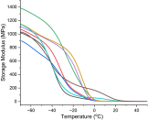 Dynamic Mechanical Analysis (DMA) |
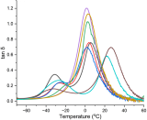 DMA: loss tangent |
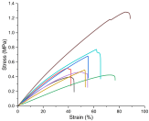 Tensile stress curves |
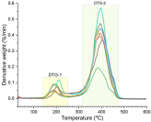 Derivative thermogravimetric analysis - 1st decomposition is ~200°C |
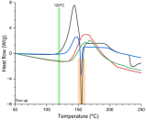 Differential Scanning Calorimetry (DSC) |
 FT-IR monitoring of epoxidation and epoxy-ring opening reactions |
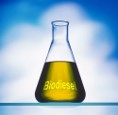 biodiesel |
 aviation biofuel |
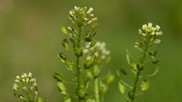 Pennycress  renewable, biobased, and petroleum-free emblems |
 Dr. Moser preparing a chemical synthesis |
Bio:
Bryan Moser is an organic chemist with expertise in oleochemistry and analytical chemistry. He was awarded a B.S. in chemistry from the New Mexico Institute of Mining and Technology in 1997 and a Ph.D. in organic synthesis in 2004 from Arizona State University. Bryan joined the Bio-Oils Research Unit at the National Center for Agricultural Utilization Research in Peoria, IL in 2005. The Moser lab is primarily focused on non-fuel, non-food industrial applications of vegetable oils as replacements or substitutes for existing petroleum-derived products. Applications may include renewable monomers for production of plastics, adhesives, coatings, latexes, various polyesters and polyurethanes, and cosmetic ingredients. Results generated during the course of this research will be important to chemical companies dedicated to incorporating bio-based materials into their product portfolios, agricultural companies interested in expanding markets for lipids and other agricultural materials, and consumers interested in products containing bio-based products. Another area of research is improving the performance of biodiesel by addressing technical deficiencies such as oxidative stability and low temperature performance as well as identifying new lipid sources that do not compete with food production or applications. Overall, the objective of research in the Moser laboratory is to reduce the environmental impact of and demand for petroleum and its various products while simultaneously enhancing agricultural utilization and rural economic development.
Click to Access my publications.

